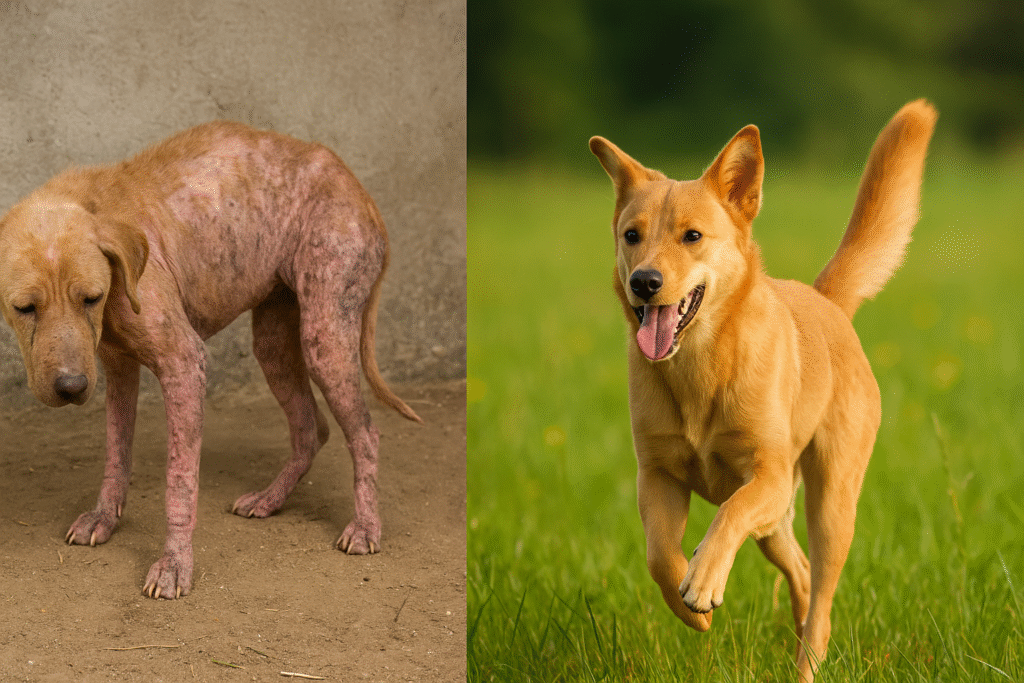Today She’s Running Through Fields With Her Tail in the Air
When Daisy was first spotted by rescuers, she was huddled behind an industrial dumpster — a shadow of the dog she once was. Her fur had nearly vanished, replaced by inflamed, cracked skin. Her body was frail. She could barely lift her head, let alone stand.
“She didn’t even flinch when we approached her,” said one volunteer. “It was like she had already given up.”
Malnourished, frightened, and covered in open sores, Daisy looked like she had been suffering for months. But just 60 days later, she was galloping through green fields, chasing butterflies with her tongue out and her tail flying like a flag of freedom.
🐾 The Turning Point That Changed Her Life
Daisy’s road to recovery was nothing short of remarkable — but it wasn’t magic. It was the result of a carefully planned, vet-guided program that combined medical care, nutrition, emotional healing, and time.
Here’s what helped turn her life around:
1. Medical Treatment for Her Skin
When she was rescued, Daisy’s skin was severely infected due to untreated dermatitis and flea infestation. The sores were painful, oozing, and left her exposed to further infection.
Veterinarians immediately started her on:
- Antibiotics to fight the infection
- Medicated oatmeal baths to soothe inflammation
- Topical balms made with natural oils to help her skin regenerate
Within one week, the redness started to subside. By the end of week three, new fur was sprouting across her back and tail.
2. Rebuilding Her Body With Proper Nutrition
Daisy weighed just 22 pounds when she was found — nearly half of what a healthy dog her size should weigh. Her diet was rebuilt from the ground up with high-quality, protein-rich food enhanced with:
- Omega-3 fatty acids for skin repair
- Vitamin E for cellular health
- Collagen supplements for fur strength
- Probiotics to heal her digestive tract
Small meals every 3 hours gave her body what it needed to absorb nutrients and rebuild safely. Her coat began shining again by day 35.
3. Creating a Safe and Loving Environment
Trauma doesn’t just live in the body — it hides in the mind. Daisy didn’t trust people. She flinched at sudden movements and refused to be touched for the first few days.
Her foster caregivers used calm voices, a consistent routine, and gentle interactions. No pressure. No expectations.
Eventually, Daisy crept onto her foster mom’s lap. Then, she started wagging. Then, she followed her around the house — and eventually, out into the world.
4. Movement That Restored Her Spirit
Initially too weak to walk on her own, Daisy’s recovery included:
- Short, supervised walks indoors
- Gentle play with toys and scent-based games
- Slowly introducing her to grassy yards and open spaces
By the second month, Daisy was running. And she hasn’t stopped since.

🌟 Why Daisy’s Story Matters
Daisy’s transformation is more than skin-deep. It represents the power of compassion, the importance of rescue work, and the fact that healing is always possible — no matter how bad things seem.
“Every time I see her tail wag, I tear up,” her adopter says. “She’s not just surviving anymore. She’s living.”
Thousands of dogs like Daisy suffer in silence, often in plain sight. This story is a reminder that with even the smallest act of kindness, lives can change.
✅ How You Can Help a Dog Like Daisy
If you ever find a stray or neglected dog, here’s what veterinary experts recommend:
- Don’t rush in — approach gently and calmly
- Offer clean water and soft food
- Contact a local rescue or shelter for safe intake
- Have the dog checked by a vet immediately
- Be patient — emotional recovery takes time
Even if you can’t adopt, your actions could give another dog the chance to thrive again.
🐶 Where Is Daisy Now?
Today, Daisy lives with a retired couple who own a cozy farmhouse and acres of open land. She’s got a plush bed, a basket full of squeaky toys, and — most importantly — a family that adores her.
From a hopeless, hurting stray to a joyful, healthy companion, Daisy’s journey is proof: Every dog deserves a second chance.